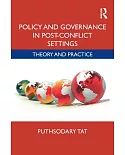This volume investigates the role of Pakistan’s grass-roots public administration structures and their quasi-legislative and quasi-judicial duties in supporting democracy, building its analysis
upon the theoretical approach taken by McAdam, Tarrow, and Tilly in Dynamics of Contention (2001), which argues that high levels of protracted consultation and instrumentation are required for
newly democratic countries to attain stability and meaningful democracy. By applying the theory to Pakistan, the authors also extend the theory through analysis of the long history of
Pakistan’s bureaucracy in relation to the theory of path dependence, as well as seeking to draw more explicit links between instrumentation and protracted consultation, the latter being
understood, in the case of Pakistan at least, as a prerequisite for the former at the grassroots level. Annotation ©2014 Ringgold, Inc., Portland, OR (protoview.com)





















